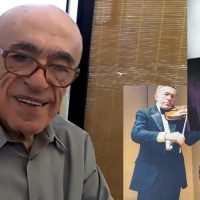Violinist Samuel Marder, “Devils among Angels: A Journey from Paradise and Hell to Life.”

SAMUEL MARDER was born in 1930 in Chernovitz, Rumania, now Ukraine. His parents, Berl and Esther, raised him and his sister Eva in a strictly religious environment.
His father had a small grocery store which his mother used to refer to good-naturedly as a nonprofit organization, because his father would provide people with groceries on credit knowing they could not pay for them. Nevertheless, Samuel and his sister Eva went to a private Hebrew school. Samuel’s religious studies began at age four and his music studies at the age of six. His first violin lessons were very unpleasant. His teacher was a rough, nervous man who was able to communicate fear more than music, but was the only teacher the family could afford. Samuel cried during the lessons but did not tell his father about his unhappy experiences. He continued his unfortunate lessons until the Soviets annexed the city and its surroundings. Although the new regime brought new fears and insecurities to the population, and many innocent families were deported to Siberia, Samuel was able to study in the local conservatory where lessons were free of charge. There he began making remarkable progress, and at age ten he won a prize which made him eligible to study in Moscow. He never went to Moscow because his family did not want to send him so far from home.
World War II interrupted Marder’s brilliant beginning, and life changed completely. The Nazis took over Czernowitz and life became hell. Many Jews were killed in the first days. A Ghetto was established and young Samuel and his family were soon deported to a Nazi concentration camp in Transnistria (Ukraine), travelling part of the distance in closed cattle cars and the rest by foot.
As they were marching through the muddy fields of Bessarabia to the camp, Samuel’s violin was ripped from his arms, and for him, the emotional pain was worse than the exhaustion, the hunger and the fear of being shot if he slowed down. The family spent three and a half years in Transnistria where his father died from typhoid and starvation.
Three more years passed before Marder was able to think of the violin again. That happened after the war when he, his mother and sister, after a long, trying journey, managed to arrive at Fohrenwald, a displaced person’s camp in Bavaria. There he continued his studies until relatives who had arrived in the U.S.A. during the first world war found out that a part of the family survived and helped them come to the United States.
In New York City, Marder continued his musical studies at the Manhattan School of Music, obtaining his Bachelor’s and Master’s degrees on full scholarship, followed by post graduate studies at Teacher’s College, Columbia University.
After graduation, he toured giving concerts throughout the U.S. and Canada with Roman Totenberg, arranged by Columbia Concert Management.
After his Alice Tully Hall recital in New York, he gave Chamber music tours throughout the U.S. followed by recitals throughout Bulgaria, Spain, Finland, South Korea, Peru, Bolivia and Israel. Marder premiered modern works, among them the unaccompanied Violin Sonata by Ben-Haim in London and in Vienna, and he gave classes during his tours in Europe, South America and Korea.
Marder served as concertmaster and assistant conductor for the Leonard Bernstein Gala Orchestra, and played in the American Symphony under Maestro Leopold Stokowski who recommended him for the position of concertmaster of the Russian Moiseyev Ballet Orchestra on their first tour throughout the U.S. and Canada. After the Moyseyev tour ended, Samuel rejoined his work with the American Symphony, where he continued until Maestro Stokowski retired, and Marder took on a concertmaster job with the National Ballet of Washington D.C. During his association with the American Symphony Orchestra, Marder conducted the American Symphony String Ensemble and the International Artists Alliance Ensemble for several seasons. He also played as solo violinist for Dame Margot Fonteyn on her tours throughout the United States and Canada.
During his many years of performing in Spain and after considerable research at the Royal Escorial Library, Marder transcribed 20 Harpsichord Sonatas from the 18th century into works for Violin and Piano and also transcribed Manuel de Falla works for violin and piano. They are now in De Falla’s private library in Madrid at the request of the composer’s family.
Mr. Marder gives many talks on prejudice and its consequences.
His current book, “Devils among Angels: A Journey from Paradise and Hell to Life” was published by IDW Publications His childhood memories and his holocaust experiences are autobiographical. The rest of the book is comprised of observations on life written in both nonfiction and fiction short stories and poems. The book was translated into German under the title “Eine Träne in die Ewigkeit,” which means “A Tear to Eternity.”
The videos below were recorded via Zoom, are organized by Success Factor, and run between 30 seconds and 9 minutes. Click on any video. You must be connected to the Internet to view the videos.
SAMUEL MARDER: 12:57 min.
INSIGHT & INSPIRATION: 3:53 min.
SELF-CONFIDENCE: 0:49 sec.
PERSEVERANCE FURTHERS: 0:56 sec.
INSIGHT & INSPIRATION: 2:11 min.
PERSEVERANCE FURTHERS: 1:26 min.
SEIZES OPPORTUNITIES: 0:59 sec.
PERSEVERANCE FURTHERS: 8:28 min.
DEVELOP A VOICE: 6:31 min.
DEVELOP A VOICE: 1:50 min.
OVERCOMES CHALLENGES TO SUCCEED: 3:43 min.
INSIGHT & INSPIRATION: 5:25 min.
SERENDIPITY: 1:33 min.
COLLABORATION: 1:53 min.
EXPOSURE TO BROAD INFLUENCES: 1:18 min.
DEVELOP A VOICE: 2:55 min.
EMPATHY: 1:19 min.
STRONG DRIVE FOR ACHIEVEMENT: 3:01 min.
UNDERSTANDS ARTISTS’ NEEDS: 2:17 min.
DEVELOP A VOICE: 1:04 min.
UNDERSTANDS ARTISTS’ NEEDS: 1:09 min.

